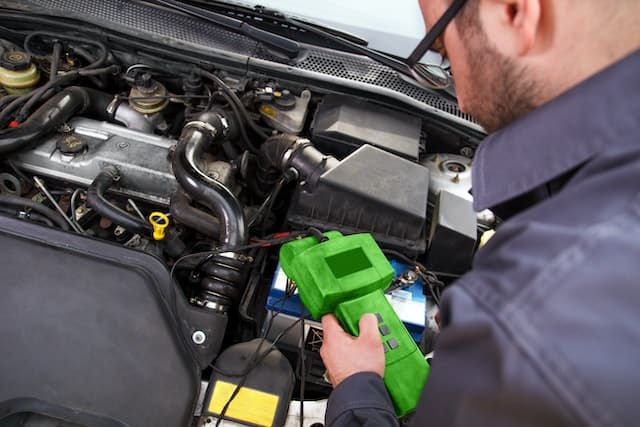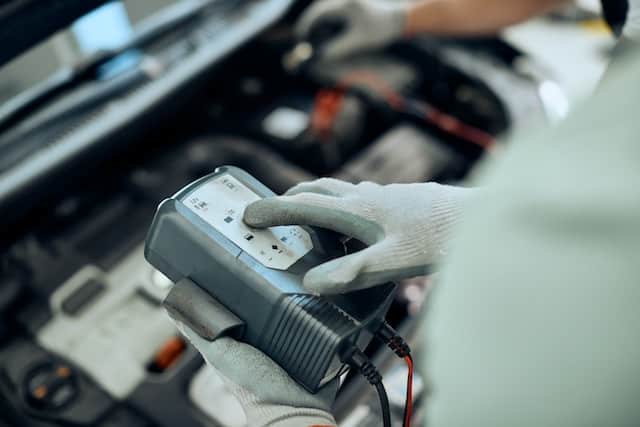
Yes, it is possible for a car battery to die without warning. Car batteries can fail for a variety of reasons, including age, corrosion, alternator issues, leaving lights on and exposure to extreme temperatures. In some cases, a battery may appear to be functioning normally one day and then fail the next, without any obvious warning signs.
Proactive Battery Care: Tips to Prevent Unexpected Car Battery Failure
[lasso id=”5402″ link_id=”1408″ ref=”amzn-noco-boost-hd-gb70-2000a-ultrasafe-car-battery-jump-starter-12v-battery-booster-pack-jump-box-portable-charger-and-jumper-cables-for-8-0l-gasoline-and-6-0l-diesel-engines” sitestripe=”true”]There are a few things you can do to help prevent your car battery from dying unexpectedly:
Keep the battery clean and free of corrosion
Corrosion can build up on the terminals of the battery over time and can interfere with the battery’s ability to charge and discharge properly. Regularly cleaning the battery and its terminals can help to prevent this issue.
Avoid extreme temperatures
Extreme temperatures can be hard on car batteries and can shorten their lifespan. If possible, try to keep your car in a garage or other sheltered location to help protect the battery from extreme temperatures.
Use a battery maintainer
A battery maintainer is a device that is designed to keep your car battery charged and healthy when the car is not in use. Using a battery maintainer can help to prevent the battery from discharging too much and can extend its lifespan.
Have the battery tested regularly
[lasso id=”5402″ link_id=”1409″ ref=”amzn-noco-boost-hd-gb70-2000a-ultrasafe-car-battery-jump-starter-12v-battery-booster-pack-jump-box-portable-charger-and-jumper-cables-for-8-0l-gasoline-and-6-0l-diesel-engines” sitestripe=”true”]Having your car battery tested regularly can help you to identify any potential issues before they become serious problems. Most auto parts stores and mechanics offer battery testing services.
If your car battery does die unexpectedly, it is important to have it replaced as soon as possible to avoid being stranded on the road. It is also a good idea to have a set of jumper cables or a portable jump starter on hand in case of emergencies.
Determining the age of your car battery
[lasso id=”5402″ link_id=”1410″ ref=”amzn-noco-boost-hd-gb70-2000a-ultrasafe-car-battery-jump-starter-12v-battery-booster-pack-jump-box-portable-charger-and-jumper-cables-for-8-0l-gasoline-and-6-0l-diesel-engines” sitestripe=”true”]Identifying the age of your car’s battery is critical as the lifespan of such batteries, although typically varying widely, can extend significantly beyond the conventional three to five years. However, to prevent unexpected failure, timely replacement is beneficial. Your purchase documentation or recorded installation date would provide the most accurate age.
But, should that be unavailable, a direct examination of the battery can yield this information. The battery, typically situated in the front right portion of the engine bay, may carry a date indicator or a code. For instance, the date might be noted as “6/15” signifying June 2015. Some batteries might have a code on a plastic strip which can be translated using a code chart. In the absence of date or code, the physical state of the battery can serve as a hint. Should you observe an aged appearance or white corrosion around the terminals, a battery test would be advisable.
Why do cars need a battery?
[lasso id=”5402″ link_id=”1411″ ref=”amzn-noco-boost-hd-gb70-2000a-ultrasafe-car-battery-jump-starter-12v-battery-booster-pack-jump-box-portable-charger-and-jumper-cables-for-8-0l-gasoline-and-6-0l-diesel-engines” sitestripe=”true”]
Cars need a battery because it is an essential component of the electrical system that powers the vehicle. The battery provides the electrical power needed to start the engine and to run the various electrical systems in the car, such as the headlights, the dashboard lights, and the radio.
The battery is also used to store electrical energy that is generated by the alternator, which is a device that charges the battery while the car is running. This stored energy is used to power the car’s electrical systems when the engine is not running, such as when the car is turned off or when the engine is not running at high speeds.
Without a battery, a car would not be able to start or run its electrical systems, which would make it difficult or impossible to use. For this reason, it is important to maintain the health of the battery and to replace it if it fails or becomes damaged.
FAQ: Can a Car Battery Die Without Warning?
[lasso id=”5402″ link_id=”1412″ ref=”amzn-noco-boost-hd-gb70-2000a-ultrasafe-car-battery-jump-starter-12v-battery-booster-pack-jump-box-portable-charger-and-jumper-cables-for-8-0l-gasoline-and-6-0l-diesel-engines” sitestripe=”true”]
Q: Can a car battery die without warning?
Although rare, a car battery can sometimes die without warning. Factors such as extreme temperatures, manufacturing defects, or sudden electrical system failures may cause a battery to die unexpectedly.
Q: What are the common signs of a dying car battery?
Common signs of a dying car battery include slow engine cranking, dimming headlights, flickering dashboard lights, weakened electrical components, and the need for frequent jump-starts.
Q: How long does a car battery typically last?
A car battery’s lifespan varies based on factors like usage, maintenance, and environmental conditions. On average, a car battery lasts between 3 to 6 years.
Q: Can extreme temperatures affect my car battery?
Yes, extreme temperatures can negatively impact a car battery’s performance and lifespan. Both hot and cold weather can cause a battery to lose its charge more quickly or even fail altogether.
Q: How can I prevent my car battery from dying unexpectedly?
[lasso id=”5402″ link_id=”1413″ ref=”amzn-noco-boost-hd-gb70-2000a-ultrasafe-car-battery-jump-starter-12v-battery-booster-pack-jump-box-portable-charger-and-jumper-cables-for-8-0l-gasoline-and-6-0l-diesel-engines” sitestripe=”true”]To prevent unexpected battery failure, perform regular maintenance, keep the battery clean and free of corrosion, avoid deep discharging, and replace the battery when it reaches the end of its expected lifespan.
Q: What should I do if my car battery dies unexpectedly?
If your car battery dies unexpectedly, you may need a jump-start or a battery replacement. If you are unsure of the cause, consult a professional mechanic for proper diagnosis and repairs.
Q: How can I check the health of my car battery?
You can check your car battery’s health using a multimeter to measure voltage, or by having a professional mechanic perform a load test or conduct a visual inspection for any signs of damage or corrosion.
Q: Can I jump-start a completely dead car battery?
While jump-starting can temporarily revive a dead battery, it may not be sufficient for a battery that is completely drained or has reached the end of its lifespan. In such cases, a battery replacement is usually necessary.
Q: Can a car battery die suddenly while driving?
Although rare, a car battery can die suddenly while driving, typically due to an electrical system failure or an alternator issue. If this occurs, the vehicle may stall or lose power, requiring immediate attention from a mechanic.
Q: Can a dead car battery be recharged?
[lasso id=”5402″ link_id=”1414″ ref=”amzn-noco-boost-hd-gb70-2000a-ultrasafe-car-battery-jump-starter-12v-battery-booster-pack-jump-box-portable-charger-and-jumper-cables-for-8-0l-gasoline-and-6-0l-diesel-engines” sitestripe=”true”]In some cases, a dead car battery can be recharged using a battery charger or by jump-starting the vehicle and allowing the alternator to charge the battery. However, if the battery is severely damaged or at the end of its life, it may need to be replaced.
Q: What are the common causes of car battery failure?
Common causes of car battery failure include age, excessive discharging, extreme temperatures, poor maintenance, manufacturing defects, and problems with the vehicle’s charging system or electrical components.
Q: Can I replace a car battery on my own?
Yes, you can replace a car battery on your own if you have the necessary tools and follow proper safety precautions. However, if you’re unsure or uncomfortable with the process, it’s best to consult a professional mechanic.
Q: How do I properly dispose of a dead car battery?
To properly dispose of a dead car battery, take it to an authorized recycling facility, an auto parts store, or a mechanic who accepts used batteries. It’s important to recycle batteries to prevent environmental harm and comply with local regulations.
Q: Will a dead battery affect my car’s computer or electronic systems?
[lasso id=”5402″ link_id=”1415″ ref=”amzn-noco-boost-hd-gb70-2000a-ultrasafe-car-battery-jump-starter-12v-battery-booster-pack-jump-box-portable-charger-and-jumper-cables-for-8-0l-gasoline-and-6-0l-diesel-engines” sitestripe=”true”]Disconnecting or replacing a dead battery may temporarily reset your car’s computer and some electronic systems, such as the radio and clock. Most settings will return to normal after the battery is reconnected and the vehicle is driven for a short period.
Q: Can a faulty alternator cause a car battery to die without warning?
Yes, a faulty alternator can cause a car battery to die without warning. The alternator is responsible for charging the battery while the vehicle is running. If it fails, the battery may not receive adequate charging, leading to sudden battery failure.
Q: How can I test my alternator to ensure it’s working properly?
You can test your alternator using a multimeter to measure the voltage output while the engine is running. A healthy alternator should output between 13.5 to 14.5 volts. Alternatively, consult a professional mechanic for a thorough inspection and diagnosis.
Q: How often should I check my car battery’s condition?
[lasso id=”5402″ link_id=”1416″ ref=”amzn-noco-boost-hd-gb70-2000a-ultrasafe-car-battery-jump-starter-12v-battery-booster-pack-jump-box-portable-charger-and-jumper-cables-for-8-0l-gasoline-and-6-0l-diesel-engines” sitestripe=”true”]It’s a good practice to check your car battery’s condition every 3 to 6 months, or during routine vehicle maintenance. Regular inspections can help identify potential issues before they become serious problems.
Q: Can leaving a car unused for long periods cause the battery to die without warning?
Leaving a car unused for extended periods may cause the battery to slowly discharge, as some electronic systems continue to draw power even when the vehicle is not in use. This can lead to a dead battery, although it generally occurs gradually rather than without warning.
Q: Can a dead car battery affect the performance of my vehicle?
A dead car battery can prevent your vehicle from starting and may cause issues with electrical systems such as lights, radio, and power accessories. However, once the battery is replaced or recharged, your vehicle’s performance should return to normal.
Q: Can I use a solar charger to maintain my car battery when it’s not in use?
[lasso id=”5402″ link_id=”1417″ ref=”amzn-noco-boost-hd-gb70-2000a-ultrasafe-car-battery-jump-starter-12v-battery-booster-pack-jump-box-portable-charger-and-jumper-cables-for-8-0l-gasoline-and-6-0l-diesel-engines” sitestripe=”true”]Yes, using a solar charger or a trickle charger can help maintain your car battery’s charge when the vehicle is not in use for extended periods. These devices provide a low, steady charge to prevent battery discharge and prolong its life.
Q: Can overcharging my car battery cause it to die without warning?
Overcharging a car battery can cause damage to the battery, including overheating, swelling, or even a sudden failure. A faulty voltage regulator or malfunctioning alternator can lead to overcharging. Regular maintenance and inspections can help prevent these issues.
Q: What is the difference between a maintenance-free battery and a conventional battery?
A maintenance-free battery is sealed and does not require periodic addition of water to the electrolyte. Conventional batteries have removable caps and may require occasional topping up with distilled water. Both types can still benefit from regular inspections and cleaning to ensure optimal performance.
Q: Can I use any type of battery charger to recharge my dead car battery?
[lasso id=”5402″ link_id=”1418″ ref=”amzn-noco-boost-hd-gb70-2000a-ultrasafe-car-battery-jump-starter-12v-battery-booster-pack-jump-box-portable-charger-and-jumper-cables-for-8-0l-gasoline-and-6-0l-diesel-engines” sitestripe=”true”]Not all battery chargers are suitable for all types of car batteries. It’s important to use a charger compatible with your specific battery type and follow the manufacturer’s instructions for charging. Using an incompatible or improperly set charger can damage the battery or even cause a fire.
Q: Can I jump-start my car with a portable jump starter if my battery dies without warning?
[lasso id=”5402″ link_id=”1419″ ref=”amzn-noco-boost-hd-gb70-2000a-ultrasafe-car-battery-jump-starter-12v-battery-booster-pack-jump-box-portable-charger-and-jumper-cables-for-8-0l-gasoline-and-6-0l-diesel-engines” sitestripe=”true”]Yes, a portable jump starter can be used to jump-start your car if the battery dies unexpectedly. Ensure that the jump starter has enough power for your vehicle and follow the manufacturer’s instructions for proper use and safety precautions.
Q: How can I prevent my car battery from draining when I have to park my car for an extended period?
[lasso id=”5402″ link_id=”1420″ ref=”amzn-noco-boost-hd-gb70-2000a-ultrasafe-car-battery-jump-starter-12v-battery-booster-pack-jump-box-portable-charger-and-jumper-cables-for-8-0l-gasoline-and-6-0l-diesel-engines” sitestripe=”true”]To prevent battery drain during extended periods of inactivity, consider disconnecting the battery or using a battery maintainer, such as a trickle charger or a solar charger. This can help maintain the battery’s charge and prevent it from dying.
Q: Can a faulty starter cause my car battery to die without warning?
A faulty starter can cause difficulties in starting the vehicle and may drain the battery due to repeated or prolonged cranking. However, it’s more likely to result in gradual battery wear rather than sudden failure. If you suspect a faulty starter, consult a professional mechanic for diagnosis and repair.
Q: How can I determine if my car battery is under warranty?
To determine if your car battery is under warranty, check the documentation provided when you purchased the battery or consult the manufacturer or retailer. Warranties typically cover manufacturing defects and may vary in duration and coverage terms.
Q: How much does it cost to replace a dead car battery?
[lasso id=”5402″ link_id=”1421″ ref=”amzn-noco-boost-hd-gb70-2000a-ultrasafe-car-battery-jump-starter-12v-battery-booster-pack-jump-box-portable-charger-and-jumper-cables-for-8-0l-gasoline-and-6-0l-diesel-engines” sitestripe=”true”]The cost of replacing a dead car battery depends on the type, brand, and capacity of the battery, as well as labor charges if you use a professional mechanic. On average, a new car battery can range from $50 to $200 or more, excluding labor costs.
Q: Can a car battery die without warning due to a parasitic drain?
A parasitic drain occurs when an electrical device in the vehicle continues to draw power from the battery even when the car is turned off. This can cause the battery to discharge over time, but the process is generally gradual rather than sudden. If you suspect a parasitic drain, consult a mechanic for diagnosis and repair.
Q: Why did my car battery die all of a sudden?
A car battery can die suddenly for a variety of reasons. The most common cause is age; batteries generally last between 3-5 years and may fail without warning after that period. Extreme temperatures, both hot and cold, can also affect battery health. Leaving electrical components like lights or the radio on while the engine is off can quickly drain a battery. Corrosion on the battery terminals can interfere with the electrical connection, leading to failure. Faulty charging systems can also be a culprit, as can frequent short drives that don’t allow the battery to fully charge. Additionally, a parasitic drain, where a system or component draws power even when the car is off, can deplete a battery. If your car battery dies suddenly, it’s advisable to diagnose the issue to prevent future occurrences.


